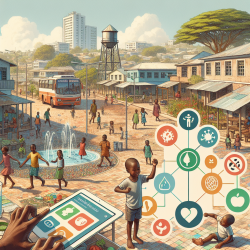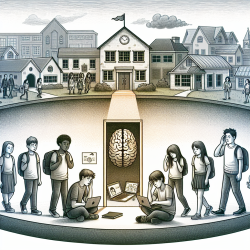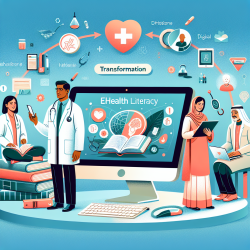Introduction
In the realm of speech language pathology, creating successful outcomes for children often involves understanding the broader social contexts in which they live. The research article "Social capital building interventions and self-reported post-disaster recovery in Ofunato, Japan" provides valuable insights into how community-based interventions can enhance recovery in post-disaster environments. This blog explores how practitioners can leverage these findings to improve their practice and foster better outcomes for children.
The Role of Social Capital in Recovery
Social capital refers to the networks, norms, and trust that facilitate coordination and cooperation for mutual benefit. In the context of disaster recovery, social capital can significantly impact the speed and effectiveness of recovery efforts. The study conducted in Ofunato, Japan, following the 2011 Tohoku earthquake and tsunami, highlights the importance of community-led initiatives in building social capital and enhancing recovery.
Key Findings from the Study
- Individuals who participated in community centers led by neighborhood elders reported higher levels of family and neighborhood recovery.
- Social capital indicators such as participation in voluntary organizations, personal networks, and trust in community members were positively associated with recovery progress.
- The study utilized robust quantitative methods, including ordinal logistic regression and propensity score matching, to establish causal links between community interventions and recovery outcomes.
Implications for Practitioners
For speech language pathologists working with children, understanding the role of social capital can be transformative. Here are some ways practitioners can apply these insights:
- Community Engagement: Encourage children and their families to participate in community activities and build networks that can provide support and resources.
- Trust Building: Foster trust within the community by promoting open communication and collaboration among families, educators, and healthcare providers.
- Empowerment Programs: Develop programs that empower families to take active roles in community-led initiatives, enhancing their resilience and recovery capabilities.
Encouraging Further Research
While the study provides valuable insights, there is still much to learn about the mechanisms through which social capital impacts recovery. Practitioners are encouraged to engage in further research to explore how these findings can be tailored to different contexts and populations. Collaborating with researchers and community leaders can lead to innovative solutions that enhance the well-being of children and their families.
Conclusion
By understanding and leveraging the power of social capital, practitioners can play a crucial role in fostering resilient communities. The findings from the Ofunato study underscore the importance of community-based interventions in disaster recovery, offering a model that can be adapted to various settings. For those interested in delving deeper into the research, the original paper provides a comprehensive analysis of the study's methodology and results.
To read the original research paper, please follow this link: Social capital building interventions and self-reported post-disaster recovery in Ofunato, Japan.










